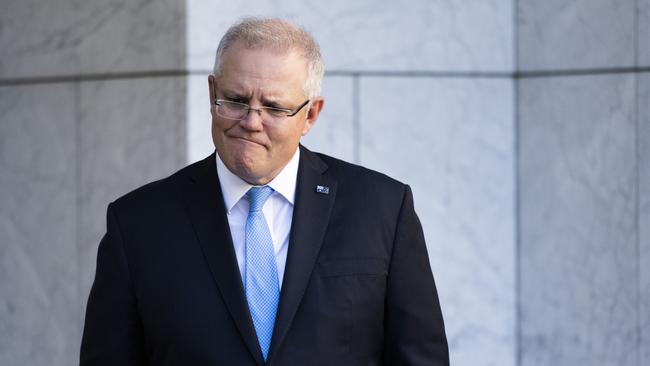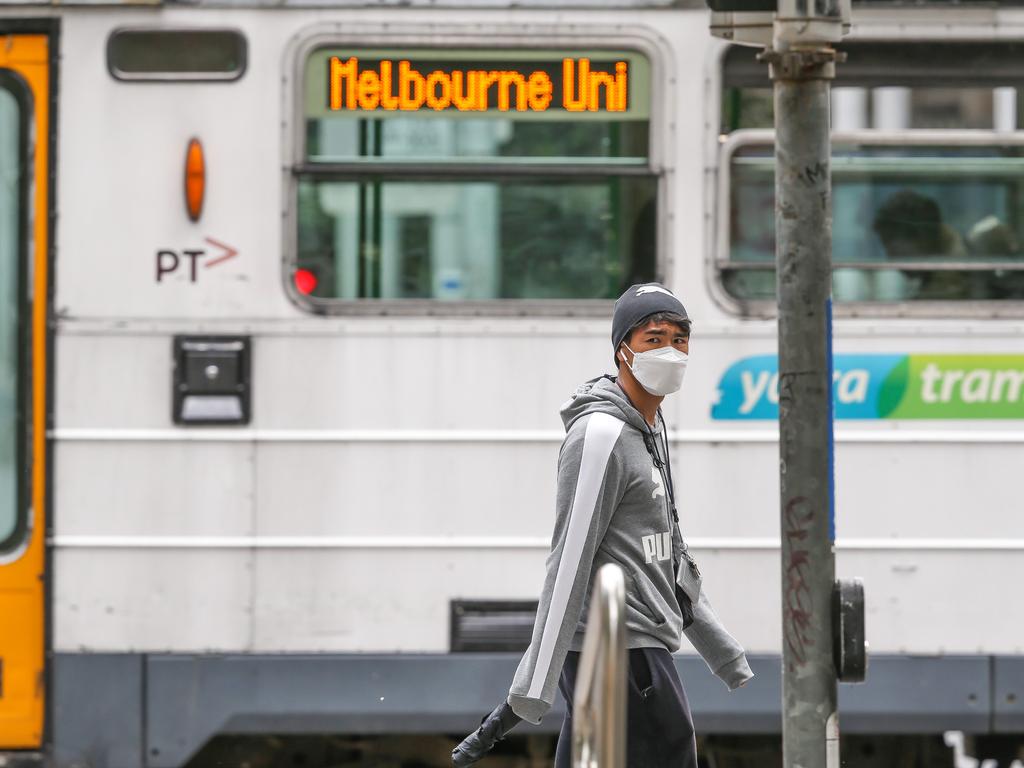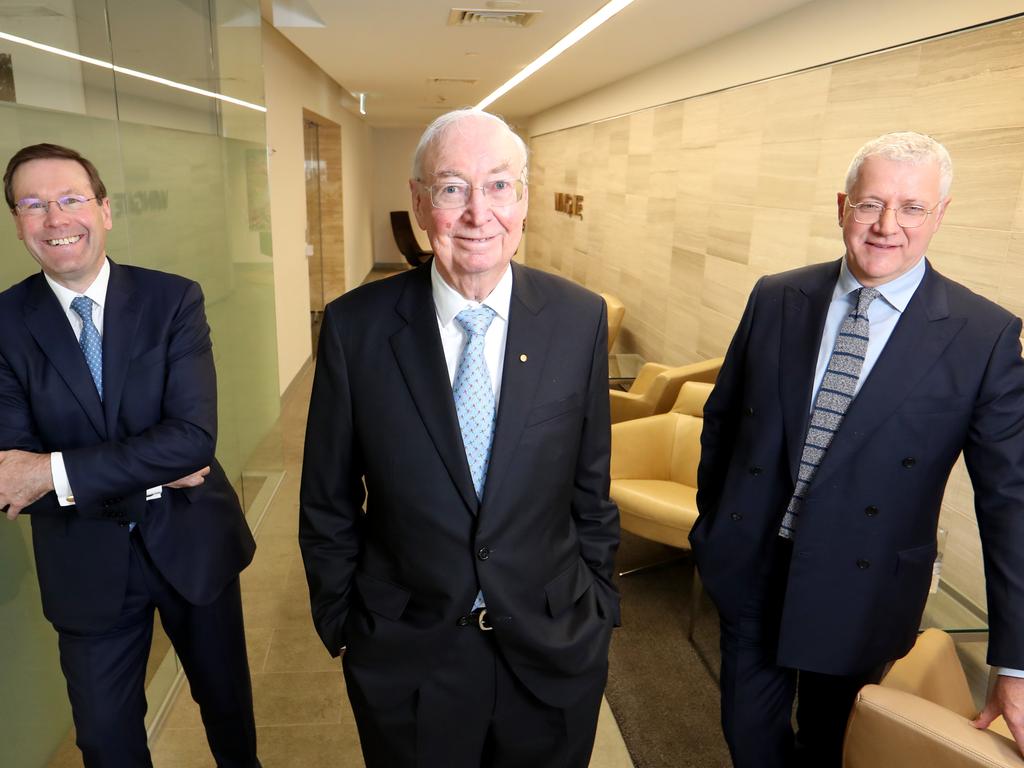Coronavirus: Jobshocker’s $60bn gaffe offers recovery windfall
A $60bn accounting error in Scott Morrison’s historic JobKeeper scheme has handed the government a shock budget windfall.

A $60bn accounting error in Scott Morrison’s historic JobKeeper scheme has handed the government a shock budget windfall but reignited the campaign for generous wage subsidies to be extended to visa-holders, universities and more casual workers.
In a joint statement on Friday afternoon, Treasury and the Australian Taxation Office revealed a “reporting error” had revised their estimated cost of the JobKeeper scheme down from $130bn to about $70bn.
The development gives the government a $60bn boost to the budget bottom line that can be deployed to fight the impact of COVID-19 in other parts of the economy or to avoid adding to the nation’s debt.
A day after Treasury officials told a COVID-19 parliamentary inquiry that 6.3 million Australians were enrolled to receive the $1500-a-fortnight JobKeeper payment, that number was revised to about 3.5 million workers.
Labor said there had “not been in more recent memory a more serious error made in the budget”.
Josh Frydenberg came under immediate pressure from the opposition, business groups, unions and higher education to use the extra $60bn to support foreign workers, casuals, university staff and employees working for foreign companies. The Treasurer warned the JobKeeper error was not an “invitation to go and spend more money”.
“All the money that the government is spending during the coronavirus period is borrowed money. There is no money tree,” Mr Frydenberg said.
Pushing back against Anthony Albanese’s call to expand JobKeeper, the Treasurer said it was “welcome news that the impact on the public purse from the program will not be as great as initially estimated”.
“The reality is there was an unintentional error by a thousand businesses and it’s pretty shameful that the Labor Party is seeking now to be politically opportunistic at the expense of Treasury and the ATO,” he said.
Treasury modelling had predicted JobKeeper would likely be deployed to support about 6.5 million workers and this appeared to have been borne out by ATO forms filled out by employers.
But the ATO and Treasury informed the government late on Thursday of a “reporting error in estimates of the number of employees likely to access the JobKeeper program”.
The Weekend Australian understands Treasury secretary Steven Kennedy also informed opposition Treasury spokesman Jim Chalmers of the error.
“The enrolment forms completed by 910,055 businesses who have self-assessed as eligible under the scheme had indicated that this program would cover around 6.5 million eligible employees,” the Treasury-ATO statement said.
“The ATO’s review of these forms has found that around 1000 of those businesses appear to have made significant errors when reporting the estimate of eligible employees on their enrolment form.
“The most common error was that instead of reporting the number of employees they expected to be eligible, they reported the amount of assistance they expected to receive. For example, over 500 businesses with ‘one’ eligible employee reported a figure of ‘1500’ (which is the amount of JobKeeper payment they would expect to receive for each fortnight for that employee).”
The revisions mean the JobKeeper and JobSeeker payments will support about 5.1 million Australians instead of the previously estimated 7.9 million out of a workforce of about 13 million.
Universities Australia chief executive Catriona Jackson said the government should reconsider its decision to exclude higher education from JobKeeper.
“As we have said in recent weeks, without greater support universities face the loss of 21,000 jobs in the next six months and a significant reduction in the essential research undertaken on our campuses,” Ms Jackson said.
“We were disappointed that the government changed the regulations on a number of occasions to effectively exclude universities. We call on them to reconsider.”
ACTU secretary Sally McManus said the government should extend JobKeeper to support temporary visa holders, casuals and higher education workers.
“The government committed $130bn to help protect the jobs of six million workers. Now we learn it will only help 3.5 million,” Ms McManus said.
“The government has opposed extending the package to casual workers, those on temporary work visas, workers in higher education, Australian workers whose company is owned by a foreign government, and those in our arts, culture and entertainment communities. Covering these workers would account for almost three million working people. Workers need this support extended … there are no more excuses.”
Australian Industry Group chief executive Innes Willox said the JobKeeper accounting error was on “the right side of the ledger”. “It’s unfortunate that the mistake has been made. But it’s on the right side of the ledger, rather than the wrong side of the ledger, so there’s more money that the government potentially has to spend or less debt that it has to pay off,” Mr Willox said.
The reporting error came to light following analysis by Treasury and the ATO assessing the amounts being paid out under the scheme and “reconciling these with the estimates provided by enrolled businesses of the likely number of eligible employees”.
“It was not picked up by the ATO earlier as their primary focus in the first fortnight of JobKeeper payments was on ensuring that JobKeeper payments were paid promptly to those eligible for them, and not paid to those who were ineligible,” the joint statement said. “Importantly this reporting error has no consequences for JobKeeper payments that have already been made to eligible businesses.”
Treasury said it remained the case that, without JobKeeper, unemployment would have been about five percentage points higher. “Treasury continues to expect the unemployment rate to reach around 10 per cent,” it said.
Mr Albanese said the JobKeeper reporting error “blows any previous mistake when it comes to economic figures in Australian history right out of the water”.
“This is a mistake you could’ve seen from space,” he said.
The Opposition Leader said the government had said “its program was fully subscribed and that the $130bn had all been allocated”.
Additional reporting: Richard Ferguson








To join the conversation, please log in. Don't have an account? Register
Join the conversation, you are commenting as Logout